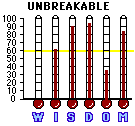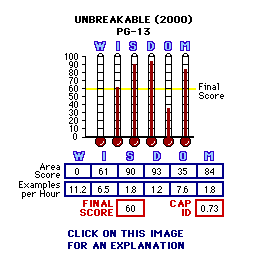Click on CAPCon Alert
image for explanation
A service to parents and grandparents
MAR20116
Unbreakable (2000), (PG-13)
CAP Score: 60
CAP Influence Density: 0.73

Click on CAPCon Alert image for explanation |
A service to parents and grandparents MAR20116 Unbreakable (2000), (PG-13) CAP Score: 60 CAP Influence Density: 0.73 |
 |
| The foul language eliminator Removes profanity from movies and TV shows Switch to LifeLine for Christian long distance service The Family Friendly  Internet Service A Christ Centered Community Web Site SPECIAL OFFER  From the best-seller book series. NOW ONLY Just in time for Christmas! Comments?  Christian Media News  A Singles Christian Network  Your One Stop  For Everything Christian Free Email Ministry  Subscribe Today!! |
 Christian Banner eXchange For FREE text-only versions of our media analysis reports as they are calculated, open this email then click "send." If your browser does not handle this URL format properly, send us a request to add you.
SUMMARY / COMMENTARY: UNBREAKABLE (PG-13) -- Do we still wonder from where kids get such ideas? Let me first repeat a warning made above. If you do not want the plot or "secrets" of this movie revealed, go elsewhere or at least skip the Summary/Commentary and move on to the Findings/Scoring section. PERSPECTIVE: We have become so drugged by the narcotics of extremes in and as entertainment progressively for so long that what once was morally unacceptable has become morally invisible. If there ever was any doubt about that, there remains no doubt with Unbreakable when a 13 year old boy in a movie can aim a gun he loaded and cocked at his father [Prov. 17:25] and the audience find acceptability in it let alone humor in it. The boy's intent was to prove his father was a super hero who could not die. Remember what God has told us in 1 Cor. 15:33 "Do not be misled: Bad company corrupts good character." The "bad company" imagery in that scene may be captured by embittered youth as power by holding dad ("unfair control") hostage rather than what the scene is supposed to be saying. There may be many emotional and social filters and barriers in the observer in the path of such imagery on its way to the brain that by the time the imagery gets to the brain all that remains of the original imagery is a picture of the power in holding dad hostage ... with a gun. Let me continue the sermon by explaining that such exposure does not make our children wise and mature. It just makes them worldly -- before their time, long before wisdom that comes with prayer, experience and age catches up. It steals their childhood from them. Recall that it is our charge as members in the Bride to be in the world but not part of it [2Cor. 10:3, 2Pet. 1:4, 1John 2:15-16, 1John 4:2-6]. Maybe it is exposure such as that above and a plethora of other matters of invasive exposure (See SAD BUT TRUE Intro), whether intentional, that serves the adversary by doing just that -- making our children part of the world: part of that which they are not to be, thus serving the adversary and not the Father, just like the adversary wants it, even if it is just a little tiny bit. And much of the stealing of childhood from children is very subliminal and even invisible to those who are victimized by it and even those charged with their care -- we parents. And this rationale sounds so closed minded and ignorant and even insane when spoken before modern morality. And when modern morality chips away at our desire to serve the Father of the Lamb and not the father of lies comes the dissonance created by wanting to serve our Lord while at the same time wanting to be accepted by man. It is a most efficient battle strategy of the adversary. But no weapon shall prosper...if our righteousness is of Him [Is. 54:17]. Unbreakable starring Bruce Willis as David Dunn, a football stadium security guard was, except for some garden-variety moments in the final scenes, an intricate and well-woven work of art and detailed ingenuity. Willis was indeed as masterful as in any other his performances in his cinematic portfolio. The support cast portrayed fully developed personages, not leaving any character development to the audience but leaving situation analysis to the audience with just enough connectivity to enable accurate construction of events by the attentive viewer. Together, these elements plus the surprising lack of special effects will not let you check your brain at the door as do many modern movies...if you go to see this movie. But this movie was as fantasy as could possibly be -- a dangerous realistic fantasy. The influence of an entity does not have to be the truth to corrupt. Many movies that have children threatening their parents portray the children as hurt, angry and bitter [Is. 30:1]. Dunn's 13 year old son, Joseph (Spencer Treat Clark) loved his father so much he wanted his father to come to grips with "reality" and accept that which Dunn had been trying to reject and ignore for years -- that he was "unbreakable." Comic books call it invulnerable. And therein is the dangerous fantasy. Dunn could not be hurt (except by water). Joseph was going to shoot his father to prove it. Do we still wonder from where kids get such ideas? I guess it is okay for movies to plant such behavioral templates in 13 year old kids -- the Motion Picture Association of America (MPAA) thinks so. Do you? As I have warned above and atop every more recent analysis webpage, if you do not want the plot spoiled, move on to the Findings/Scoring section or to a movie review service. A comic book art collector/dealer and art show curator, Elijah Price (Samuel L. Jackson) spent most of his fragile life trying to find his reciprocal: the one who would make him complete; the opposite of himself. At birth Elijah suffered two broken arms and two broken legs due to a congenital disease that made his bones extremely fragile, so fragile that as an early teen he pretended to be injured to prevent going outside. This led to mom encouraging Elijah to venture into the cruel world by rewarding outdoor escapades with comic books, buying him a new one each time he went outside. Fifty-four bone breaks later, Elijah becomes a collector and dealer of comic books and comic book art. This exposure also led Elijah to believe comic book super powers are just "exaggerations of the truth": that many people really do have super powers which are simply undiscovered or inadequately harnessed: that such power in comic books is just exaggeration of the truth. Elijah manufactured that somewhere is someone who is invulnerable to bone breaks. And he set out to find this super man, no matter how many lives it took to do it. Dunn was that "someone." Strangely enough, Dunn had been walking through life with a "wha'..who...where" bewilderment. An emptiness that was destroying his marriage to his high school sweetheart who shared in a car wreck with him -- in which he was not hurt, not a scratch, but she was. The distance Dunn kept himself from those who loved him was feeding the emptiness he felt -- until he found his true identity. Once discovered and once explained by his "mentor" Elijah, all was well and a life of fighting evil and injustice was born. In addition to the horror of the scene of Joseph holding his father hostage at gunpoint, some other ugliness was presented as Dunn walked the path to discovering what he was. As he "sensed" evil and wrongdoings by clairvoyance clairvoyance [Eccl. 7:14], the writers presented the evil and wrongdoings -- graphically. In the scene where Dunn tested and exercised his super power for the first time to save the lives of two kids and bring a bad guy to justice, the filth and brutality of murderous behavior and the almost as filthy and brutal behavior in heroic combat with evil were clearly evident. I suppose if there were a super-hero name to be used for Dunn it would be "Vigilante-man." Some of the issues not typically acceptable for 13 year old by parents include the use of firearms to control and kill, vulgar demands, graphic brutality, and lies to a father. Some explosive programming violently shattered periods of calmness and a continuous darkness and sinister aura [Eph. 5:11, 2 Pet. 2:17 , Rev. 16:10] were questionable for many. And some supernatural mumbo-jumbo [Deut. 18:10] and the use of God's name in vain with the four letter expletive [Deut. 5:11] presented the use of sin as entertainment. As always, it is best to refer to the Findings/Scoring section -- the heart of the CAP analysis model -- for the most complete assessment possible of this movie. FINDINGS / SCORING: 
NOTE: Multiple occurrences of each item described below may be likely, definitely when plural. Wanton Violence/Crime (W): Impudence/Hate (I)(1): Sex/Homosexuality (S): Drugs/Alcohol (D): Offense to God (O)(2): Murder/Suicide (M)(3):  |